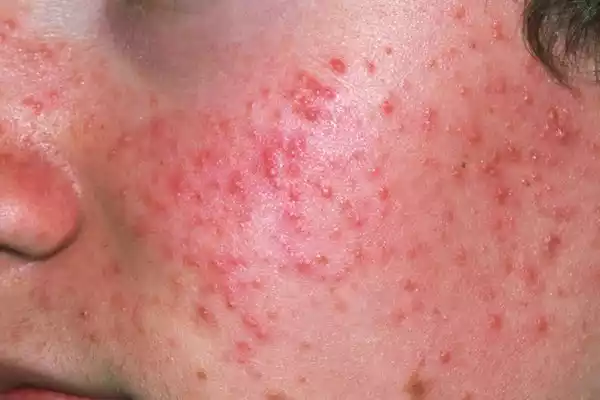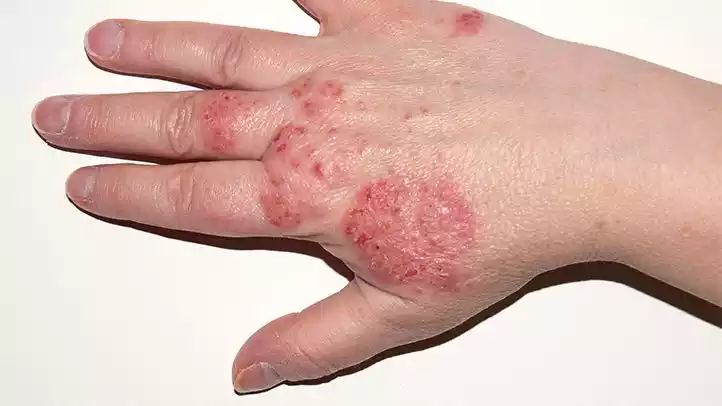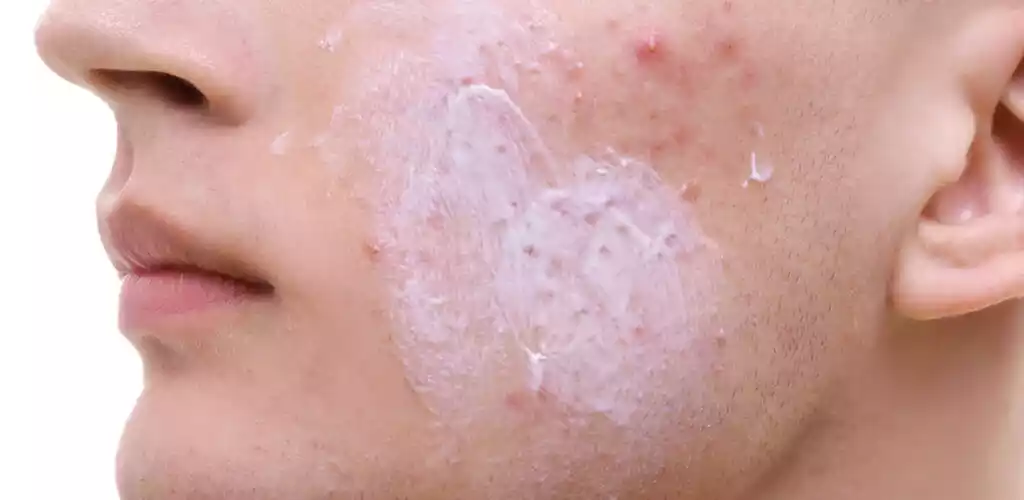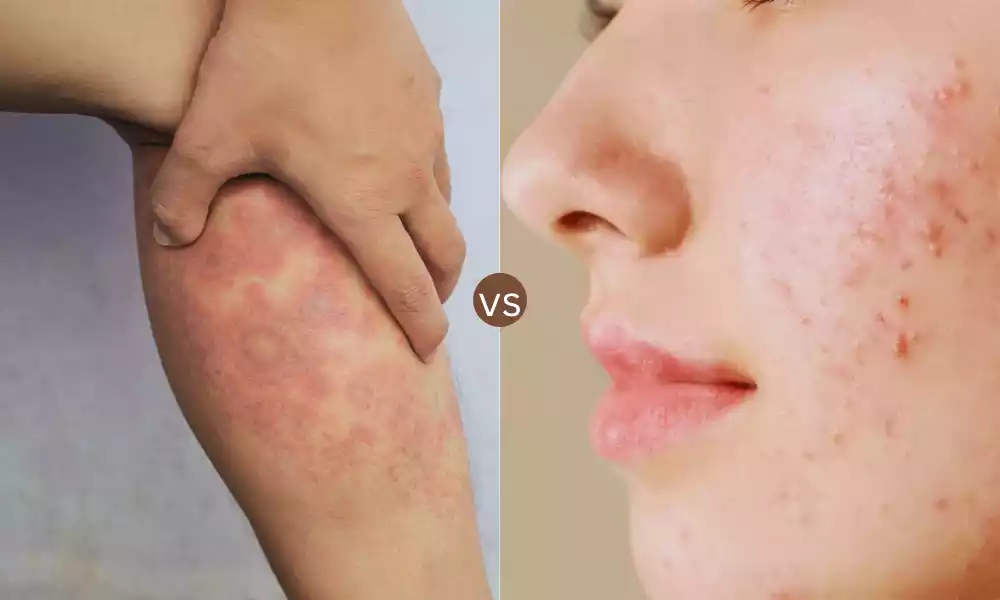Brief description of acne and eczema
Acne: Acne is a common skin condition characterized by the occurrence of inflamed or infected sebaceous glands in the skin. It manifests as pimples, blackheads, whiteheads, and sometimes deeper lumps (cysts or nodules) on the face, neck, chest, back, shoulders, and upper arms. Factors such as hormonal changes, excess oil production, and bacteria can contribute to its development.

Eczema: Eczema, also known as atopic dermatitis, is a chronic, inflammatory skin condition that leads to red, itchy patches on the skin. These patches can become rough, and scaly, and can occasionally ooze or bleed, especially after scratching. Eczema often emerges in early childhood and can persist into adulthood, though it may improve over time. The exact cause of eczema is not fully understood but is believed to be linked to a combination of genetic and environmental factors. It’s commonly associated with other allergic conditions like asthma and hay fever.
Acne and Eczema in the comparative chart
Comparative Chart: Acne vs. Eczema
| Attribute | Acne | Eczema |
|---|---|---|
| Definition | A skin condition resulting from the clogging or inflammation of sebaceous glands. | A chronic, inflammatory skin condition causing itchy, red patches. |
| Common Causes | – Excess oil production<br>- Dead skin cells<br>- Bacteria<br>- Hormonal changes | – Genetic factors<br>- Abnormal immune responses<br>- Environmental triggers (allergens, irritants)<br>- Skin barrier dysfunction |
| Symptoms/Appearance | – Blackheads<br>- Whiteheads<br>- Pimples, pustules, and papules<br>- Nodules and cysts | – Red, itchy patches<br>- Rough or scaly skin<br>- Oozing or crusting<br>- Darkened areas of skin |
| Common Locations | Face, back, chest, shoulders, and upper arms | Inside of the elbows, behind the knees, hands, face, and neck |
| Potential Complications | – Scarring<br>- Dark spots<br>- Psychological impact (e.g., low self-esteem) | – Chronic itching leading to skin infections<br>- Sleep disturbances<br>- Associated with other allergic conditions (e.g., asthma) |
| Treatment Options | – Over-the-counter treatments (e.g., salicylic acid, benzoyl peroxide)<br>- Prescription medications (e.g., topical retinoids, antibiotics)<br>- Therapies (e.g., light therapy) | – Moisturizing<br>- Topical corticosteroids<br>- Avoiding triggers<br>- Prescription medications (e.g., calcineurin inhibitors) |
| Prevention/Self-Care | – Gentle skincare routine<br>- Use of non-comedogenic products<br>- Avoid popping or picking | – Regular moisturizing<br>- Avoid scratching<br>- Identify and avoid triggers |
Note: Both acne and eczema have varied manifestations and can differ in severity among individuals. Consulting a dermatologist is essential for proper diagnosis and treatment.
The importance of distinguishing between the two
Distinguishing between acne and eczema is crucial for several reasons:
- Different Causes and Mechanisms:
-
- Acne primarily results from clogged pores due to excess oil, dead skin cells, and the presence of bacteria.
- Eczema is an inflammatory response often associated with genetic factors, environmental triggers, and an abnormal immune response.
- Treatment Approaches Differ:
-
- Acne treatments often focus on reducing oil production, eliminating bacteria, exfoliating dead skin cells, and reducing inflammation.
- Eczema treatments target inflammation, itch relief, and skin barrier repair. This can involve moisturizers, corticosteroids, antihistamines, and newer medications like biologics or calcineurin inhibitors.
- Potential Complications:
-
- Misdiagnosing and treating acne as eczema (or vice versa) might exacerbate the condition. For example, some oily creams used for eczema might worsen acne. Conversely, drying acne treatments can aggravate eczema.
- Psychological and Emotional Impacts:
-
- Both conditions can have significant psychological effects due to their visible nature. Properly identifying and treating them can help reduce associated stresses, anxieties, and potential self-esteem issues.
- Associated Health Conditions:
-
- Eczema is often associated with other atopic conditions, such as asthma or hay fever. Recognizing eczema might alert healthcare providers to screen for these related conditions.
- Prevention and Management Strategies:
-
- Eczema might be triggered or worsened by specific allergens or irritants, from certain foods to particular fabrics. Recognizing the condition can help in identifying and avoiding these triggers.
- On the other hand, lifestyle factors such as diet, skincare routines, and hormone management might play a more significant role in acne management.
- Chronicity and Evolution Over Time:
-
- Acne, especially when it appears during teenage years, might resolve or decrease in adulthood. However, it can persist or even start in adulthood.
- Eczema, especially when it begins in early childhood (often referred to as “infantile eczema”), can change in nature as one grows. Some children outgrow it, while others might continue to have flare-ups into adulthood.
By correctly distinguishing between acne and eczema, individuals can seek the most appropriate treatments, avoid unnecessary complications, and achieve a better quality of life.
Causes of Acne and Eczema
Here’s a detailed breakdown of the causes of acne and eczema:
Causes of Acne:
- Excess Oil Production: Overactive sebaceous (oil) glands can produce too much sebum (oil).
- Dead Skin Cells: Skin sheds dead cells over time. When the body produces an excessive amount of sebum and dead skin cells, they can accumulate to clog the hair follicles.
- Clogged Pores: When the hair follicles get clogged with oil and dead skin cells, it can result in acne. These clogs can manifest as whiteheads, blackheads, or other types of pimples.
- Bacteria: Once a pore becomes clogged, it can become a breeding ground for bacteria, especially Propionibacterium acnes. This bacterial growth can lead to redness, inflammation, and pus.
- Hormonal Changes: Fluctuations in hormone levels, especially androgens, can stimulate sebaceous glands to produce more oil. This is particularly prevalent during puberty, menstruation, pregnancy, and when using certain medications, such as corticosteroids, lithium, or oral contraceptives.
- Diet: Some research suggests that foods with a high glycemic index and dairy products might be linked to acne, though the relationship is still under investigation.
Causes of Eczema:
- Genetic Factors: Eczema tends to run in families, suggesting a genetic predisposition. Mutations in the gene responsible for creating filaggrin (a protein that helps maintain a protective skin barrier) have been identified in some people with eczema.
- Abnormal Immune Response: Eczema is sometimes considered an overactive response by the body’s immune system to an irritant.
- Skin Barrier Dysfunction: A compromised skin barrier allows moisture to escape and lets in allergens and microbes. This can lead to dryness, irritation, and increased susceptibility to inflammation and infection.
- Environmental Triggers: These can include:
-
- Allergens like pollen, pet dander, dust mites, and mold.
- Irritants like soaps, detergents, shampoos, disinfectants, and certain fabrics like wool.
- Climatic factors such as cold, dry air or excessively humid conditions.
- Foods: Some people’s eczema symptoms are exacerbated by consuming certain foods, including dairy, nuts, wheat, soy, and eggs.
- Stress: While stress doesn’t cause eczema, it can exacerbate the symptoms.
- Hormonal Fluctuations: Changes in hormones can cause eczema flare-ups, especially in women (e.g., during periods, pregnancy, or menopause).
While both acne and eczema have identified causes, individual experiences can vary widely, and a combination of factors often contributes to flare-ups. Always consult a dermatologist or healthcare professional for accurate diagnosis and treatment.
Symptoms and Appearance
Let’s detail the symptoms and appearances of both acne and eczema:
Acne:
- Blackheads (Open Comedones): Small, dark spots on the skin. These are pores that are clogged with sebum and have an open surface, leading to oxidation and a dark appearance.
- Whiteheads (Closed Comedones): Small, raised bumps on the skin. These are pores that are clogged with sebum and are closed at the surface.
- Pimples (Papules and Pustules):
-
- Papules: Small red raised bumps caused by inflamed or infected hair follicles.
- Pustules: Similar to papules but filled with pus. They appear as red at the base with a white or yellow center.
- Nodules: Large, solid, and often painful lumps beneath the surface of the skin. They result from the buildup of secretions deep within hair follicles.
- Cysts: Large lumps on the skin’s surface that are soft to the touch, filled with pus, and can be painful. They can lead to scars.
Eczema (Atopic Dermatitis):
- Itchy Skin: Often intense itching, which may be more severe at night.
- Redness: Affected areas of the skin may become reddish or brownish (in darker skin tones).
- Swelling: Inflamed patches can become swollen, especially after scratching.
- Dry, Sensitive Skin: The skin might feel leathery or dry to the touch.
- Rough or Scaly Patches: These can sometimes appear lighter or darker than the surrounding skin.
- Oozing or Crusting: When scratched or if severe, the skin might ooze a clear or yellowish liquid that can crust over the affected area.
- Thickened, Cracked Skin: Chronic scratching or the persistent nature of eczema can lead to skin that is thickened and may crack, especially in areas like the hands and feet.
- Darkened Areas: Parts of the skin affected by eczema might darken, a phenomenon known as post-inflammatory hyperpigmentation.

Both acne and eczema have distinct symptoms and appearances, but their manifestations can vary among individuals. It’s important to consult with a dermatologist or healthcare professional if you’re unsure about your skin condition.
Potential Complications
Both acne and eczema can lead to various complications if not properly managed or treated.
Let’s delve into the potential complications for each:
Acne:
- Scarring: One of the most common complications of acne. Picking, popping, or squeezing acne lesions can increase the risk. Deep nodules and cysts are more likely to leave behind scars.
- Post-Inflammatory Hyperpigmentation (PIH): After an acne lesion heals, it can leave a flat, discolored spot. This isn’t a true scar but rather a post-inflammatory change in the skin pigment, which can fade over time.
- Skin Infections: Open acne sores can become infected, leading to increased pain, swelling, and a potential spread of bacteria.
- Psychological Impacts: Chronic or severe acne, especially during teenage years, can lead to reduced self-esteem, anxiety, and depression.
- Adverse Reactions to Treatment: Some acne treatments, both topical and oral, can cause side effects ranging from skin irritation to more severe issues like gastrointestinal disturbances or allergic reactions.
Eczema:
- Skin Infections: Broken skin from scratching can allow bacteria, viruses, or fungi to enter, leading to infections. Signs include increased redness, pus, and warmth around affected areas.
- Chronic Itch and Scratch Cycle: Persistent itching can lead to more scratching, which exacerbates the itchiness, leading to an ongoing cycle that can worsen eczema.
- Eye Complications: Eczema around the eyes or frequent rubbing/scratching of the eyes can lead to conditions like conjunctivitis, eyelid dermatitis, or cataracts.
- Sleep Disturbances: The intense itching of eczema, especially at night, can interfere with sleep.
- Psychological Impacts: Like acne, chronic or severe eczema can have psychological effects. It can affect self-esteem and can also lead to feelings of isolation, depression, or anxiety.
- Thickened Skin (Lichenification): Chronic scratching or rubbing can cause the skin to become thick and leathery.
- Adverse Reactions to Treatment: Just as with acne, treatments for eczema, particularly corticosteroids, can have side effects. Overuse can lead to skin thinning, while abrupt cessation can result in flare-ups.
For both conditions, early intervention and appropriate management can help reduce the risk of these complications. It’s essential to work closely with a dermatologist or healthcare professional to identify the best treatment approach and monitor any potential complications.
Treatment Options for Acne and Eczema
Here’s a breakdown of the treatment options for acne and eczema:
Acne Treatment Options:
- Topical Treatments:
-
- Benzoyl Peroxide: An antimicrobial that reduces the amount of acne-causing bacteria on the skin.
- Salicylic Acid: Helps unclog pores.
- Topical Retinoids (e.g., tretinoin, adapalene): They promote cell turnover and prevent hair follicles from becoming clogged.
- Topical Antibiotics (e.g., clindamycin): Reduce bacteria that can cause pimples.
- Oral Treatments:
-
- Oral Antibiotics (e.g., tetracycline, doxycycline): Used for moderate to severe acne to reduce bacteria and fight inflammation.
- Oral Contraceptives: Can be effective for women with acne that comes from hormonal causes.
- Isotretinoin: A powerful medication for severe cystic acne.
- Medical Procedures:
-
- Light and Laser Therapy: Kills bacteria and reduces the appearance of scars.
- Chemical Peels: Removes the top layer of the skin, leading to a smoother surface.
- Drainage and Extraction: A method to remove large cysts and nodules.
- Over-the-counter (OTC) Products: Many OTC products contain ingredients like benzoyl peroxide, salicylic acid, or alpha hydroxy acids.
Eczema Treatment Options:
- Topical Treatments:
-
- Corticosteroids: Creams and ointments to reduce inflammation and itching. These come in different strengths, from mild OTC versions to stronger prescription ones.
- Calcineurin Inhibitors (e.g., tacrolimus, pimecrolimus): Non-steroidal creams that reduce inflammation and prevent flare-ups.
- Barrier Repair Moisturizers: These aim to reduce water loss and repair the skin.
- Systemic Medications:
-
- Oral Corticosteroids (e.g., prednisone): Used for severe cases but not recommended for long-term use due to potential side effects.
- Immunosuppressants (e.g., cyclosporine, methotrexate): These suppress the immune system to prevent it from causing flare-ups.
- Biologics: Drugs like dupilumab target specific parts of the immune system to prevent inflammation.
- Light Therapy (Phototherapy): Exposing the skin to controlled amounts of natural sunlight or UVB light from an artificial source.
- Wet Wraps: Involves applying water-soaked fabric wraps made of gauze or clothing to the affected skin to keep it moist and help medications penetrate.
- Bleach Baths: Mild bleach baths can reduce bacteria on the skin, decreasing the risk of infections.
- Environmental and Lifestyle Adjustments: Includes avoiding known triggers, frequent moisturizing, and using mild, fragrance-free soaps and detergents.

Both acne and eczema have a range of treatment options depending on the severity, type, and individual needs. It’s essential to consult with a dermatologist or healthcare professional to identify the most suitable treatment and to monitor its effectiveness and potential side effects.
Prevention and Self-Care of Acne and Eczema
Both Acne and Eczema can benefit from preventive measures and self-care practices.
Here’s a guide to help maintain clear and healthy skin for both conditions:
Acne Prevention and Self-Care:
- Gentle Cleansing: Wash your face with a mild cleanser and lukewarm water twice a day to remove excess oil and impurities.
- Avoid Over-cleansing: Excessive washing or using harsh scrubs can irritate the skin and worsen acne.
- Use Non-comedogenic Products: Choose makeup, sunscreens, and other skin products labeled non-comedogenic, meaning they won’t clog pores.
- Avoid Touching Your Face: Keep your hands, phone, and hair away from your face to reduce the spread of oil and bacteria.
- Don’t Pop Pimples: Popping can cause infections, make acne worse, and increase the risk of scarring.
- Sun Protection: Some acne treatments can make the skin more sensitive to sunlight. Use a broad-spectrum sunscreen and avoid excessive sun exposure.
- Avoid Foods that Trigger Acne: For some people, specific foods might exacerbate acne. Keep a food diary to identify and reduce intake of such foods.
- Stay Hydrated: Drinking water helps keep your skin hydrated.
- Regular Exercise: It increases blood flow and helps nourish skin cells, but remember to shower afterward to wash away sweat.
Eczema Prevention and Self-Care:
- Moisturize Regularly: Keeping the skin hydrated can prevent dryness and reduce the severity of eczema flares. Apply moisturizer right after bathing.
- Avoid Known Triggers: This can include allergens, irritants, or certain foods.
- Bathing Habits: Use lukewarm water and limit bath/shower time. Use mild, fragrance-free soaps or non-soap cleansers. Pat the skin dry gently and avoid rubbing.
- Use a Humidifier: Adding moisture to the air can help prevent skin dryness, especially in dry climates or during winter.
- Wear Soft, Breathable Fabrics: Cotton and other natural fibers are usually best. Avoid materials like wool or synthetic fabrics that can irritate the skin.
- Keep Nails Short: This can reduce the damage from scratching. Consider wearing gloves at night if nighttime scratching is a problem.
- Manage Stress: Stress can be a trigger for eczema flares. Techniques like meditation, deep breathing exercises, and getting adequate sleep can help.
- Stay Hydrated: Drinking plenty of water keeps the skin hydrated from the inside out.
- Avoid Rapid Temperature Changes: Sudden changes can trigger a flare-up, so try to avoid quick transitions from cold to hot environments.
For both acne and eczema, understanding one’s body and triggers is essential. While the above measures can help in management, it’s crucial to consult a dermatologist or healthcare professional if symptoms persist or worsen. They can provide guidance tailored to individual needs.
Conclusion
Acne and eczema are distinct skin conditions, each with its own set of causes, symptoms, and treatments. While acne predominantly revolves around the hair follicles and sebaceous glands, eczema is tied to the skin’s inability to retain moisture and the immune system’s overreactions.
Both conditions can have significant physical and psychological impacts, emphasizing the importance of proper diagnosis, treatment, and self-care. Recognizing the differences and similarities between these conditions helps in managing and alleviating their symptoms, leading to better skin health and overall well-being.
Reference books
If you’re looking for reference books on the topics of acne and eczema, here are some well-regarded books that provide comprehensive information:
For Acne:
- “Acne For Dummies” by Herbert P. Goodheart, MD: This book offers a user-friendly guide to understanding and managing acne, including its causes, treatments, and prevention.
- “The Acne Cure: The Nonprescription Plan That Shows Dramatic Results in as Little as 24 Hours” by Terry J. Dubrow, MD, and Brenda D. Adderly: Dr. Dubrow outlines a holistic approach to treating acne with a focus on diet, lifestyle changes, and over-the-counter treatments.
- “The Acne Prescription: The Perricone Program for Clear and Healthy Skin at Every Age” by Nicholas Perricone, MD: Dr. Perricone provides insights into the connection between diet, inflammation, and acne, along with strategies for clear skin.
For Eczema:
- “Eczema Free: Forever Natural Cure for Eczema” by Sophie Morgan: This book explores natural remedies and lifestyle changes to manage and potentially alleviate eczema symptoms.
- “Living with Eczema: Mom’s Perspective” by Rebecca Raymond RN: This book offers a personal perspective on dealing with eczema, with practical advice and insights from a mother of a child with eczema.
- “Eczema Diet: Itch No More! End of Eczema: Eczema No More! Stop & Prevent Eczema” by Karen Fischer: Karen Fischer, a nutritionist, presents a dietary approach to managing eczema by addressing potential triggers in one’s diet.

